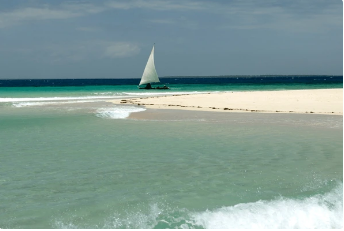Pangani Village: Where History Meets Serenity
Located 52 kilometers south of Tanga, Pangani is a tranquil village perched where the Pangani River flows into the Indian Ocean. This picturesque location is steeped in history and surrounded by pristine natural beauty.
Historical Charm
Pangani’s rich past is evident in its weathered yet captivating old Arab houses and colonial architecture, remnants of a once-prosperous trading hub. The village played a significant role during the 19th century as a port for the ivory and slave trade, and it was here that Bushiri, a leader in the Arab Revolt of 1888–1889, was captured and executed. The history of Pangani is intertwined with the river that served as both a trade route and a natural refuge for dhows during the suppression of the slave trade.
Natural Attractions
- Pristine Beaches:
Pangani boasts a variety of beautiful beaches, from the serene Ushongo Beach with its white sands and swaying coconut palms to the quieter resorts north of town. Ushongo Beach, in particular, offers warm waters perfect for swimming even at low tide, and its smooth sands are ideal for cycling along the shore. - Marine Activities:
Nearby coral reefs and marine reserves make Pangani a great destination for snorkeling and diving. Sea turtle nesting sites add to its ecological charm.
Local Culture and Community Tourism
The Pangani Coast Cultural & Eco-Tourism Program (PCCT) connects visitors to the local Swahili community through cultural tours, cooking classes, and visits to nearby fishing villages. This initiative offers unique, interactive experiences while supporting local livelihoods.
Tanga: A Blend of History and Adventure
Tanga, a larger coastal city to the north, is an ideal gateway to explore Tanzania’s historical and natural wonders.
Amboni Caves:
A must-visit, these limestone caves are East Africa’s largest and boast intricate formations and fascinating folklore.
Historical Significance:
Tanga was a key colonial port, and its German and British colonial influences are evident in its architecture. The Tongoni Ruins, a 15th-century Swahili settlement, offer a glimpse into the area’s ancient past.
Beaches and Marine Adventures:
- Tanga's coastline features stunning beaches perfect for relaxing and enjoying the ocean breeze.
- Saadani National Park, nearby, is unique as the only park in Tanzania where wildlife safaris meet the beach.
Getting to Pangani and Tanga
- Pangani: Accessible via an unpaved road from Tanga. While the drive through sisal plantations is scenic, it can become challenging during the wet season. Buses from Tanga run until early afternoon.
- Travel Tips:
- Bring cash, as Pangani has limited banking facilities and no ATMs.
- Respect local customs by dressing modestly in town, while swimwear is acceptable on the beach.
Why Visit Pangani and Tanga?
Both destinations are perfect for travelers seeking tranquility, cultural immersion, and a taste of Tanzania’s authentic coastal life. From relaxing on untouched beaches to exploring ancient ruins and connecting with local communities, Pangani and Tanga offer an experience far removed from mass tourism. Embark on a journey to these hidden gems, where history, culture, and nature converge to create unforgettable memories. 🌴

No comments:
Post a Comment